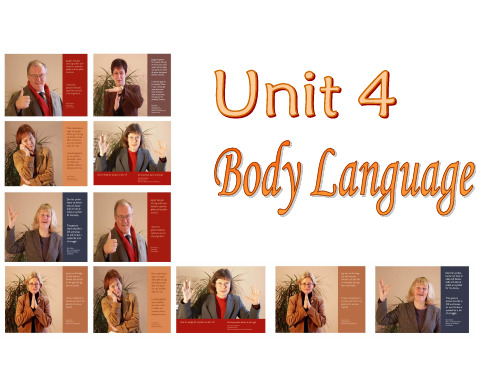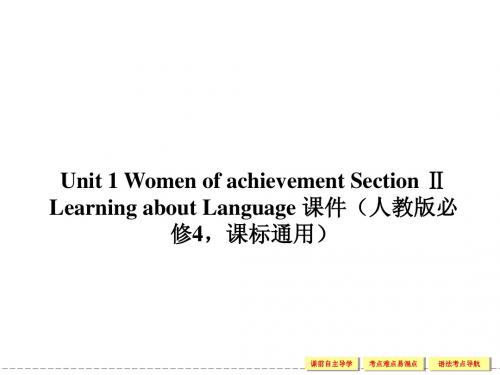2014-2015学年高中英语配套课件:Unit 4《Section Four Using Language》人教版必修1
- 格式:ppt
- 大小:2.04 MB
- 文档页数:21


Period 2 A sample lesson plan for Learning about Language(The Direct Object and Indirect Object)IntroductionIn this period students will be rewriting the text PLANT EXPLORATION IN THE 18TH AND 19TH CENTURIESfirst. Then they shall go on to learn about verbs with the direct object and indirect object. At the end they may be given a test.Objectives■To help students rewrite the text learned■To help students learn about verbs with the direct object and indirect object ■To help students use some wordsProcedures1. Warming up by writing, by imitation, a passage of your own based on the textPLANT EXPLORATION IN THE 18TH AND 19TH CENTURIES2. Discovering useful words and expressionsDo plants grow better if you talk to them? I don’t know.Now let’s go to page 34 to skim the two exercises text to get an overview of what are being talked about.Go to page 32 to scan the text for words and expressions to plete the two exercises on page 34.3. Learning about verbs with the direct object and indirect object当及物动词有两个宾语时,两个之间有些无须介词,有些那么需要。



人教版高中英语unit4课件全文共3篇示例,供读者参考篇1Unit 4 of the People's Education Edition high school English textbook focuses on the theme of "wildlife protection". In this unit, students will learn about the importance of conserving wildlife, the threats facing various animal species, and what can be done to help protect them. The unit includes readings, listening exercises, writing tasks, and speaking activities to help students practice their English language skills while learning about this important topic.One key reading in this unit is a passage on the endangered giant panda. Students will learn about the habitat of the giant panda, the reasons for its decline in numbers, and the efforts being made to protect this iconic species. This reading will help students understand the impact of human activities on wildlife and the importance of conservation efforts.In addition to readings, students will also engage in listening exercises that focus on different aspects of wildlife protection. They will listen to interviews with conservationists, wildlifeexperts, and local communities to gain a deeper understanding of the challenges and successes in wildlife conservation.Writing tasks in this unit will allow students to express their own opinions on wildlife protection. They will be asked to write essays, letters, and reports on topics such as the role of zoos in conservation, the impact of climate change on wildlife, and the importance of sustainable development in protecting natural habitats.Furthermore, speaking activities will give students the opportunity to discuss these topics with their classmates and practice their oral communication skills. They will participate in group discussions, role-plays, and debates on issues related to wildlife protection, allowing them to express their ideas and listen to others' perspectives.Overall, Unit 4 of the People's Education Edition high school English textbook provides students with a comprehensive understanding of the importance of wildlife protection and the actions that can be taken to preserve biodiversity. By engaging with this unit, students will not only improve their English language skills but also develop a greater appreciation for the natural world and the need to protect it for future generations.篇2Unit 4 of People's Education Press High School English textbook is a comprehensive unit that covers various topics related to culture and festivals. In this unit, students will learn about different festivals celebrated around the world, as well as cultural traditions and customs associated with these festivals.The unit begins with an introduction to the concept of festivals and their significance in different cultures. Students will learn about the history and origins of various festivals, as well as how they are celebrated in different countries. This section also includes vocabulary related to festivals, such as decorations, rituals, and traditions.One of the main topics covered in this unit is Chinese festivals. Students will learn about traditional Chinese festivals such as the Spring Festival, Mid-Autumn Festival, and Dragon Boat Festival. They will explore the customs and traditions associated with these festivals, as well as the stories and legends behind them.In addition to Chinese festivals, students will also learn about festivals from other countries, such as Christmas, Easter, Diwali, and Thanksgiving. They will compare and contrast the customsand traditions of these festivals, as well as the similarities and differences between them.The unit also includes a section on cultural exchange programs and activities, where students can learn about different cultures and traditions through experiential learning. This could include participating in cultural exchange workshops, attending cultural performances, or even visiting cultural landmarks.Overall, Unit 4 of the People's Education Press High School English textbook provides students with a comprehensive understanding of different cultures and festivals around the world. By studying this unit, students will develop a greater appreciation for cultural diversity and learn to respect and celebrate the traditions of others.篇3Unit 4 of the People's Education Press (PEP) high school English textbook covers a variety of interesting topics related to communication skills. In this unit, students will learn how to express opinions, make suggestions, agree and disagree, and give advice in English. The unit also includes vocabulary related to communication, such as expressions for agreeing anddisagreeing, phrases for giving advice, and words for describing emotions and feelings.One of the key objectives of Unit 4 is to help students improve their spoken and written communication skills in English. The unit includes a variety of activities and exercises designed to help students practice using the new vocabulary and grammar structures they have learned. For example, students may be asked to engage in role-playing exercises where they have to express opinions or give advice to a partner. They may also be asked to write short essays or dialogue scripts that demonstrate their understanding of the new language structures.In addition to improving communication skills, Unit 4 also introduces students to different cultural perspectives on communication. For example, students may learn about the importance of politeness and indirectness in communication in some cultures, while in others, directness and assertiveness may be valued.Overall, Unit 4 of the PEP high school English textbook is designed to be engaging and informative, providing students with the opportunity to practice and improve their communication skills in English while also learning about different cultural perspectives on communication. By the end ofthe unit, students should feel more confident in their ability to express themselves in English and engage in meaningful conversations with others.。
